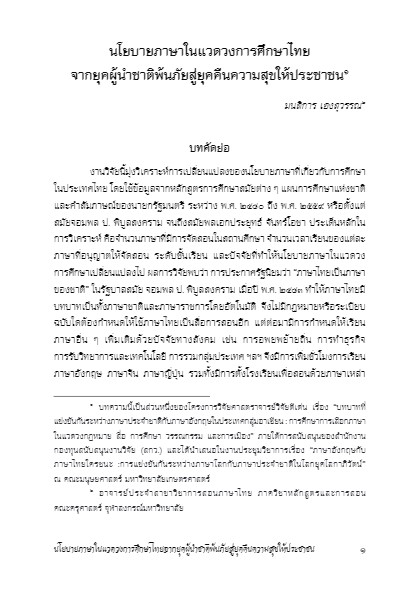มนสิการ เฮงสุวรรณ
บทคัดย่อ
งานวิจัยนี้มุ่งวิเคราะห์การเปลี่ยนแปลงของนโยบายภาษาที่เกี่ยวกับการศึกษาในประเทศไทย โดยใช้ข้อมูลจากหลักสูตรการศึกษาสมัยต่างๆ แผนการศึกษาแห่งชาติและคำสัมภาษณ์ของนายกรัฐมนตรี ระหว่าง พ.ศ. 2480 ถึง พ.ศ. 2559 หรือตั้งแต่สมัยจอมพล ป. พิบูลสงคราม จนถึงสมัยพลเอกประยุทธ์ จันทร์โอชา ประเด็นหลักในการวิเคราะห์ คือจำนวนภาษาที่มีการจัดสอนในสถานศึกษา จำนวนเวลาเรียนของแต่ละภาษาที่อนุญาตให้จัดสอน ระดับชั้นเรียน และปัจจัยที่ทำให้นโยบายภาษาในแวดวงการศึกษาเปลี่ยนแปลงไป ผลการวิจัยพบว่า การประกาศรัฐนิยมว่า “ภาษาไทยเป็นภาษาของชาติ” ในรัฐบาลสมัย จอมพล ป. พิบูลสงคราม เมื่อปี พ.ศ. 2483 ทำให้ภาษาไทยมีบทบาทเป็นทั้งภาษาชาติและภาษาราชการโดยอัตโนมัติ จึงไม่มีกฎหมายหรือระเบียบฉบับใดต้องกำหนดให้ใช้ภาษาไทยเป็นสื่อการสอนอีก แต่ต่อมามีการกำหนดให้เรียนภาษาอื่นๆ เพิ่มเติมด้วยปัจจัยทางสังคม เช่น การอพยพย้ายถิ่น การทำธุรกิจ การรับวิทยาการและเทคโนโลยี การรวมกลุ่มประเทศ ฯลฯ จึงมีการเพิ่มชั่วโมงการเรียนภาษาอังกฤษ ภาษาจีน ภาษาญี่ปุ่น รวมทั้งมีการตั้งโรงเรียนเพื่อสอนด้วยภาษาเหล่านี้อีกด้วย การเปลี่ยนแปลงใด ๆ ที่เกิดขึ้นกับนโยบายภาษาในแวดวงการศึกษา แสดงให้เห็นถึงวิสัยทัศน์ทางด้านนโยบายภาษาของผู้นำรัฐบาล และสถานการณ์การช่วงชิงพื้นที่ระหว่างภาษาไทยซึ่งเป็นภาษาประจำชาติกับภาษาต่างประเทศ
คำสำคัญ : นโยบายภาษา, แวดวงการศึกษา, หลักสูตรการศึกษา, รัฐบาลไทย
(ตีพิมพ์ใน วารสารไทยศึกษา ปีที่ 14 ฉบับที่ 1 (มกราคม – มิถุนายน 2561) หน้า 1-31)
Changes in the Thai National Language Policy in the Education System from the Plaek Phibunsongkhram to Prayut Chan-o-cha Periods
Manasikarn Hengsuwan
Abstract
This research attempts to analyze the changes of language policy in education in Thailand by studying information in Thailand’s education curriculums, announcements and interviews by prime ministers from 2480-2559 B.E. – that is, from Field Marshal Plaek Phibunsongkhram to General Prayut Chan-O-Cha. The main issues are the number of languages that have been taught in schools, the number of hours of each language is allowed to be taught, and factors that cause changes to language policies in education. The results show that the Nationalist Announcement, which stated that “Thai language is Thailand’s national language”, in the government led by Field Marshal Plaek Phibunsongkhram in 2483 B.E. resulted in Thai language becoming the national and official language. This led to a situation whereby no other curriculum was needed to ensure that Thai language was used in instruction, except in cases where it was required to enforce the learning of other languages owing to social changes, such as migration, business, technology advancement and allying with other countries. This caused an increase in learning hours of English, Chinese and Japanese, as well as the establishment of schools that specifically teach those languages. Accordingly, changes in language policies in the education system have been indicators of the visions of government leaders, as well as a sign of the competition between Thai language and other languages.
Keywords : Language Policy, Education Domain, Curriculum, Thai Government
(Published in Journal of Thai Studies Volume 14 Number 1 (January – June 2018) Page 1-31)
บทความ / Full Text : Download
